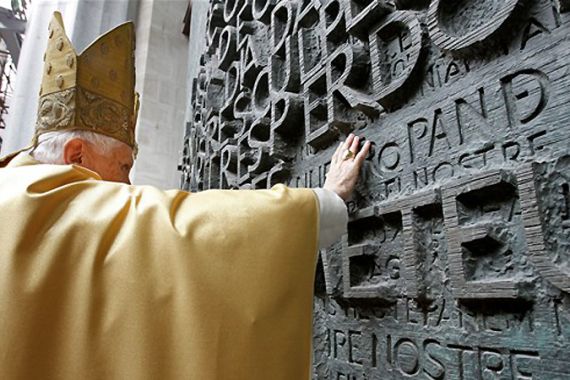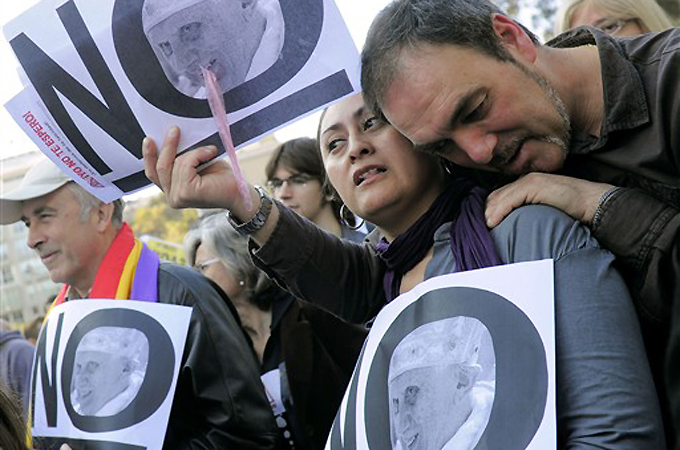Pope consecrates Spanish basilica
Benedict condemns country’s laws on divorce, abortion and gay marriage as he inaugurates Barcelona’s Sagrada Familia.

 |
| Women’s rights and gay rights advocates protested against the Vatican’s promotion of ‘traditional’ values [AFP] |
Pope Benedict XVI has defended “traditional families” and the rights of the unborn, while criticising Spanish laws that allow gay marriage, fast-track divorce and easier abortions.
His comments came during a ceremony on Sunday to consecrate Barcelona’s new basilica, the Sagrada Familia.
An estimated 250,000 people came out to cheer Benedict and watch as he formally inaugurated the architectural marvel, still unfinished after more than 100 years of construction.
Around 200 protesters staged a “kiss-in” outside the church as Benedict hosted a mass to formally inaugurate the Sagrada Familia.
Several hundred women also marched to protest against their status in the church, and the Vatican’s opposition to birth control.
More than 500 people marched behind banners reading “The woman decides to be a mother” and “Condoms save, the pope damns”.
Same-sex unions opposed
In his homily, Benedict noted that the church of the Sagrada Familia – a soaring Art Nouveau basilica with sandcastle-like spires – was conceptualised as a temple to the sacred family of its name, Jesus, Mary and Joseph.
He condemned same-sex marriage and divorce, saying families are built on the “indissoluble love of a man and a woman” who should be provided with financial and social benefits from governments.
He criticised policies allowing for abortions, saying “the life of children [must] be defended as sacred and inviolable from the moment of their conception”.
|
Al Jazeera’s Barbara Serra reports on the consecration by Pope Benedict of Spain’s newest basilica in Barcelona |
Benedict’s comments on Sunday marked the second time in as many days that Benedict has criticised the policies of Spain’s socialist government and called for Europe as a whole to rediscover Christian teachings and apply them to everyday life.
Al Jazeera’s Barbara Serra reported that while Benedict has “got his message through” and that he remains popular in predominantly Catholic Spain, his remarks are unlikely to affect the country’s political direction.
“I don’t think that this visit will have any impact on the Spanish government,” she said.
In his remarks, Benedict said the dedication of the Sagrada Familia church was of great importance “at a time in which man claims to be able to build his life without God, as if God had nothing to say to him”.
The church, which was declared a basilica, is the masterwork of Antoni Gaudi, a Barcelona architect and Catholic who dedicated his life to the project but died in 1926, only a few years after it was begun. He is on the path to possible sainthood.
Gaudi praised
Benedict praised Gaudi for integrating nature, scripture and liturgy in his masterpiece in a way that overcame the distinction between the temporal and the eternal world.
“Antoni Gaudi did this not with words but with stones, lines, planes and points,” Benedict said.
Benedict has focused much of his pontificate on trying to fight secular trends in the West such as the legal recognition of same-sex unions.
Jose Luis Rodriguez Zapatero’s socialist government in Spain has supported a legislative agenda that has deeply angered the Vatican, allowing gay marriage, quicker divorces and easier abortions.
Benedict was to meet Zapatero privately at the airport before departing on Sunday, a low-profile event that reflected their divergent views.
He has visited Spain twice and has a third trip planned next year, an indication he sees this once staunchly Roman Catholic country as a battleground for the faith’s future in Europe.